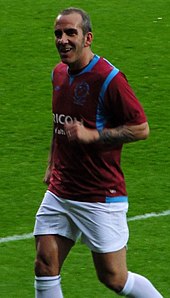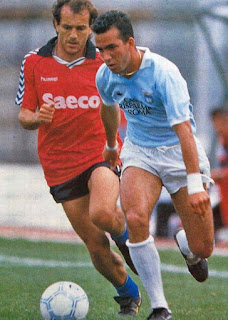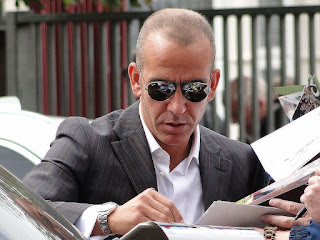Sublime talent overshadowed by fiery temperament
The brilliant but controversial footballer Paolo Di Canio was born on this day in 1968 in the Quarticciolo neighbourhood of Rome.
Paolo Di Canio had four
successful years at West Ham
Di Canio, an attacking player with a reputation for scoring spectacular goals, played for several of Italy’s top clubs but also forged a career in Britain, joining Glasgow Celtic in Scotland and representing Sheffield Wednesday, West Ham United and Charlton Athletic during a seven-year stay in England.
After finishing his playing career back in Italy, he returned to England to become manager of Swindon Town and then Sunderland, although it was a brief stay.
Di Canio scored almost 150 goals in his career but his fiery temper landed him in trouble on the field while his political views - he was openly a supporter of fascism - attracted negative headlines off it.
Despite growing up in a working-class area of Rome which was a stronghold of AS Roma fans, Di Canio supported their city rivals SS Lazio from an early age.
As a child, he was overweight, but his love for football drove him to beat his addiction to junk food and high-calorie fizzy drinks and become supremely physically fit.
He signed his first professional contract with Lazio in 1985 at the age of 17, having impressed with the club’s Under-19 team, spending a season on loan at the lower division club Ternana before making his senior debut in Lazio colours in October 1988.
 |
| Di Canio began his career with the club he supported as a boy, Lazio |
It soon became clear that Di Canio was a highly-talented player and it was not long before he earned a move to Juventus in 1990. However, he found himself competing for a place against such stars as Roberto Baggio, Salvatore Schillaci, Pierluigi Casiraghi, Fabrizio Ravanelli, Gianluca Vialli, and Andreas Möller and his displeasure at not being given more game time led to a falling-out with coach Giovanni Trapattoni.
He moved to Napoli and, after one season, to AC Milan, with whom he won a Serie A medal in 1996 but again could not hold down a permanent role in the side and departed after a row with their coach, Fabio Capello.
His next move was to Scotland, joining Celtic, where he scored 15 goals in 37 games in the 1996-97 season, easily the best return of his career. He was the Scottish Professional Footballers Association player of the year but after his demand for a substantial pay rise was knocked back he refused to travel on the club’s pre-season tour to the Netherlands and was swiftly offloaded.
Di Canio’s next club was in England, where manager David Pleat made the inspired decision to team him up with another Italian forward, Benito Carbone, at Sheffield Wednesday. As the two became a brilliant double act, scoring 25 goals between them in the 1997-98 Premier League season, Pleat’s gamble in paying £4.2 million for Di Canio looked to have paid off.
It all turned sour, however, in September of the following season in one of the most notorious incidents in the history of the Premier League when Di Canio was so incensed at being shown the red card by referee Paul Alcock in a match against Arsenal that he pushed the official to the ground. Banned for 11 matches and fined £10,000, Di Canio never played for Wednesday again.
 |
| Di Canio signing autographs on a return visit to Upton Park in 2010. He had been hugely popular there |
A year with another London club, Charlton Athletic, proved less successful and in 2004 he returned to Italy, rejoining his first club, Lazio. It was there that his political views came to the fore. Having revealed in his autobiography in 2001 that he was an admirer of Italy’s Fascist dictator, Benito Mussolini, he would sometimes celebrate a goal with a fascist salute, much to the delight of the far-right political factions among the Lazio fans.
Their adoption of Di Canio as a figurehead did not sit well with the club’s hierarchy, who felt the club’s reputation was being damaged. In 2006 his contract was not renewed. He signed instead for a lower league club, Cisco Roma, where he had two seasons before announcing his retirement in 2008.
Three years later, he returned to England to begin a career in management. In his first job, at Swindon Town, he won promotion to from League Two to League One in his first season and might have gone on to enjoy more success had the club not hit the rocks financially. He moved next to Sunderland, but his time on Wearside ended after only six months, despite him supervising a stunning 3-0 win away to arch rivals Newcastle United in only his second match.
Sunderland had lost their vice-chairman, the Labour politician David Miliband, and the patronage of the Durham Miners’ Association because of Di Canio’s political views, but it was after complaints from the players about his treatment of them that he was sacked in September, 2013.
Despite applying for several jobs subsequently, Di Canio has not worked in management again, although in an interview in 2021 he expressed a continuing desire to return to England should an opportunity arise.
Travel tip:
The former police headquarters in Quarticciolo
is an example of the area's stark architecture
Quarticciolo, which can be found about 10km (six miles) east of Rome’s city centre, is part of the Alessandrino district and is a predominantly working class neighbourhood. It was built by the Fascist regime in the late 1930s and bears many of the characteristics of the architectural styles favoured at the time, combining stark urban lines with occasional echoes of classicism. At its centre was the Casa del Fascio, which served as the municipal offices and the headquarters of the party. Residential apartments were strictly assigned depending on size of family or societal status, with some set aside for war widows, some for active soldiers, others to members of the Fascist militia. Ironically, as German troops occupied Rome after the fall of Mussolini in 1943, the area became a stronghold for partisans and resistance fighters and the operational base for Giuseppe Albano, a famous partisan known as Il Gobbo di Quarticciolo - the Hunchback of Quarticciolo - and his Gobbo Gang.
Travel tip:
The Palazzo Spada, which dates back to the
mid-16th century, is one of Terni's older buildings
Before he made his Serie A debut for Lazio, Paolo di Canio spent a period on loan with Ternana, a smaller club based in the city of Terni, in Umbria, which is situated about 95km (59 miles) north of Rome, near the border with Lazio. Terni was left in need of substantial renewal after the Second World War and therefore combines historical buildings with more modern ones. For example, in the central Piazza della Repubblica, which stands where the forum of the Roman city of Interamna was located, is the Palazzo Spada, which was designed by Antonio da Sangallo, who died in Terni in 1546. By contrast, the Corso del Popolo, the central thoroughfare behind Palazzo Spada, was built in the post-War period, while the Lancia di Luce, a 30m high steel artwork by Arnaldo Pomodoro, was added as recently as 1993.
Also on this day:
1879: The birth of musician Ottorino Respighi
1897: The birth of politician Manlio Brosio
1950: The birth of tennis star Adriano Panatta
1964: The birth of footballer Gianluca Vialli









